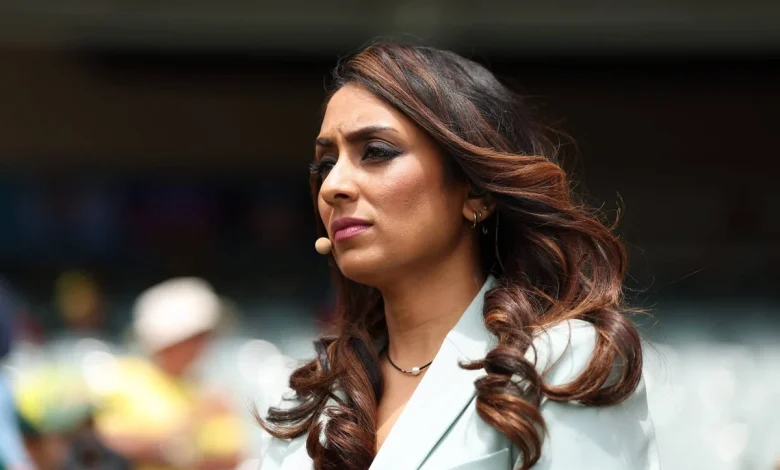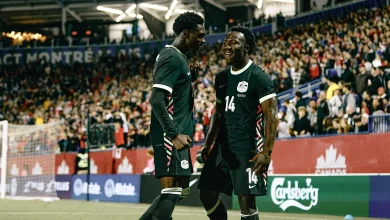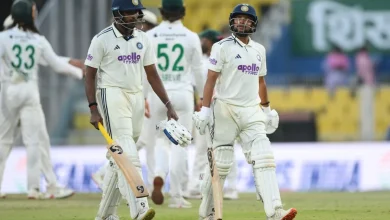Isa Guha interview: ‘We want to advance ethnic diversity in cricket and increase girls’ participation’

The Athletic has launched a Cricket WhatsApp Channel. Click here to join.
Isa Guha is talking with all the experience that comes after spending the past eight winters in ‘enemy’ territory as a Pom in Australia’s Fox Sports commentary box.
“I’ve seen so many touring teams come here to Australia and, invariably, they don’t get it right in the first Test,” Guha tells The Athletic from her Sydney base before travelling to Perth for the opening day of the Ashes on Friday.
“I’m like: ‘Have you not been watching the last few series in Australia? These are the lengths you need to bowl and this is what you need to do against these great bowlers’. Most of them have the capabilities to do it, but they just don’t start well. That’s why I’m really intrigued by this first Test and whether England can get it right.”
Perhaps, she believes, they will. “I am more optimistic this time from an English point of view because, under Ben Stokes, anything is possible. But, like everyone, I am concerned about England’s build-up and whether they can hit the ground running,” says Guha.
“They’ve got the players to win, no question, but they’ve got to be on it from Perth, otherwise it can go downhill very quickly, as we’ve seen so often in the past.”
Stokes bucking recent history and at least competing with Australia on their own soil would certainly make life easier for one of England’s two representatives, along with Michael Vaughan, in a Fox TV box crammed with Australian legends.
“You know you’re in real trouble when it turns to sympathy,” smiles double World Cup and Ashes-winning bowler Guha about the reception that awaits the former England cricketers in the Australian-dominated commentary team.
“The job as a commentator is to build up a contest, so when you get to the third or fourth Test and you’ve already lost the series, it can become quite tricky.
“We’ll have to bat away the Aussies, but to be fair, they are all usually respectful. Mark Howard (the presenter) will get stuck into you if the Poms are having a shocker, but the feed goes worldwide anyway, so nobody can be too biased.”
Guha flanked by Australian greats turned Fox commentators Adam Gilchrist (left) and Mark Waugh (Paul Kane/Getty Images)
Whether England compete or not, Guha will describe the Ashes with the calm, insightful authority that has made her one of the leading female sports commentators and presenters, not just in cricket, but with the BBC at Wimbledon and the 2024 Olympics.
And she will combine her duties with Fox by leading another Ashes ‘tour’, this one a fundraising effort with her charity, ‘Take Her Lead’, which promotes equality and diversity and works to ensure every woman and girl can fulfil their potential and thrive in cricket.
“The concept came about in 2020,” says Guha. “I was looking back on my personal journey, knowing I was then one of only six players from ethnically diverse backgrounds who had ever played for the England women’s team.
“We know through the ICEC report (the independent commission for equity in cricket in 2023) that there’s under-representation for women at every level, there’s been a culture of misogyny, and we were hearing there was no sense of belonging.
“We want to advance ethnic diversity in cricket to increase participation for women and girls and support other charities doing wonderful things to create the best possible environment for a woman to stay in the sport.
“Between the ages of 10 and 15, girls are 20 per cent more likely to drop out of sport than boys, and there are a lot of reasons for that. One great quote I heard is that boys need to be competitive to feel they belong, but girls need to feel they belong before they can be competitive. I always use that because it makes sense to me.
“When I was speaking to young girls, it became clear they were facing the same issues I faced 20 years ago. There’s all this amazing investment coming in at the top level of the women’s game, but still a lot of work needing to be done in grassroots and at community level for girls to truly believe they belong.”
Isa Guha celebrates with Sarah Taylor after taking the wicket of India’s Hemlata Kala in August 2006 (Paul Gilham/Getty Images)
Take Her Lead was born in part in honour of Guha’s mother, Roma, who died six years ago. “There were definitely times when I was 12 or 13 when I wanted to quit cricket, but I didn’t because of amazing advice I had from Mum and older players who were on the pathway and took me under their wing,” she says.
“Mum was a huge encouragement to me playing sport. My father as well. He set up a girls’ section at our local cricket club, but it was Mum who persuaded him it was OK for me to start playing with the boys.
“Traditional South Asian families may have frowned upon a girl playing in a boys’ team and a British Indian playing alongside British Pakistani boys and other British boys. But Mum didn’t see any issues, and I will always be really grateful for that.”
That encouragement helped Guha become, in 2001, aged 16, the first woman of South Asian heritage (her parents come from Kolkata) to play for England in any sport.
“At the time, quite a few journalists wanted to speak to me about that, but I was a bit embarrassed about it all,” she says. “I was the youngest in the team, and I didn’t want to draw any unnecessary attention towards myself.
“I just wanted to get my head down and do my best for England, but as time went on, I realised the importance of visibility and role models. Even more so in the last decade, when I’ve been working in broadcasting. Just seeing someone like me on screen might inspire young South Asian girls to go on and do the same.”
Isa Guha and former Olympic bronze medal-winning javelin thrower Goldie Sayers (to the right of the banner) at a Take Her Lead mentoring session (Photo courtesy of Take Her Lead)
That broadcasting career has developed ever since she took what was then the surprise decision to retire from international cricket aged 26. She had won just about everything the game could offer with England and “just felt the time was right to step away”.
“I was terrible when I first started commentating, honestly, I was,” says Guha. “I just wanted to get as good as I could be as a broadcaster, and that meant throwing myself into different situations, being a presenter, a reporter, a commentator and a pundit.
“I wanted to be on both TV and radio with broadcasters around the world because they all do things differently and want different things for their audience. I just wanted to soak it all in and learn. That’s what’s led me to these opportunities.”
Those opportunities now include being one of the faces of the BBC’s Wimbledon coverage and presenting a highlights show from the Paris Olympics.
“I never imagined I would be doing Wimbledon, I never imagined I’d be working with (broadcasters) Clare Balding and Sue Barker,” says Guha. “I would watch them on TV and think they were amazing. They’re the doyens of BBC Sport. I would watch them in awe, so to be actually working alongside them made me scratch my head a little bit and wonder how it happened.
“Wimbledon was a last-minute opportunity for me. The BBC decided two months out that they needed an extra person because the days were getting longer for Sue.
“So, like everything I’ve ever done, I just jumped in without a lot of knowledge on how it would all work. It’s one of the hardest things to do technically, and it was quite intense at first, but I feel so privileged and honoured to be there speaking to people like Tim Henman, John McEnroe, Martina Navratilova, and all these brilliant legends of tennis.
“With tennis, you have to know what you’re talking about, so I do as much preparation as I can for that. With the Olympics, it’s different because you’re effectively like the viewer. They’re not expecting you to know everything about every sport and they want you to ask the questions they want answers to.
“They can be basic questions about what the sport entails and the mindset, and what I love is getting into the mind of the athlete. I’ve been so grateful for the journey, but it’s a bit like playing, you’re only as good as your last broadcast.”
Isa Guha watches Australia’s captain Tahlia McGrath toss the coin alongside Nat Sciver-Brunt of England ahead of the Women’s World Cup fixture in October (Matt Roberts-ICC/ICC via Getty Images)
Guha’s last broadcast before the Ashes was a big one, watching India win the women’s World Cup in India, something she believes will be a game-changer.
“Look at what happened and the amount of inspiration the India team provided,” she says. “It captured the imagination of the whole nation and a lot of Indian fathers will want to encourage their daughters now to play cricket. It’s such a landmark moment for the sport and that will filter through to the UK.
“When I see a moment like that, I think about all those who have gone before. When I first started playing for England, Mum and Dad invited the whole India team round for dinner one night when they were touring and they were picking the brains of the likes of Anjum Chopra and Jhulan Goswami.
“I know what these women have been through and you could argue it’s been a tougher journey for them because while we were opening people’s eyes and the perception around women’s sport was changing in the UK, it has taken a lot longer in India. But people can’t look away now.
“I’ve always maintained India will become a dominant sporting nation when they start engaging with the half of their population that haven’t been engaged before. They are starting to do that now. This moment will be massive for that.”
For now, Guha’s full attention is on the most celebrated battle in the men’s game and calling the biggest moments for a mainly Australian audience.
“We’ve been through a tough time at Fox losing Shane Warne and Andrew Symonds in recent years,” she says. “You develop a rapport with your colleagues, and Warnie was one of those people I just loved working with.
“I loved his aura and our friendship and how he gave me confidence in the commentary box. He will always be missed. ‘Roy’ (Symonds) was just this big, cuddly bear. So every year we remember them, but even more so during an Ashes because that’s where the Aussies love to shine.”
And, while working with the likes of Adam Gilchrist, Mark Waugh and Mike Hussey, there will be one TV colleague she will be keeping a careful eye on because of his propensity to lure her into gaffes and bouts of giggling – former Australian leg-spinner Kerry O’Keeffe, now a commentator known for his comedic moments as the man they call Skull.
Commentator and former Australian cricketer Kerry O’Keeffe, the man known as Skull (William West/AFP via Getty Images)
“He’ll be fired up,” she smiles. “There have been so many funny moments with Skull. When you’re calling the cricket, you have to be on your guard because he can say anything at any point and you have to be ready.
“You have to give yourself a couple of seconds to take in what he’s said! It just comes out of nowhere. I can just see him in the corner of the commentary box now with mischief on his face. He’s a bit like Dr Evil in the Austin Powers movies. Or I could imagine him sitting there with a cat on his lap like Blofeld in the Bond movies. It’s going to be fun.”




